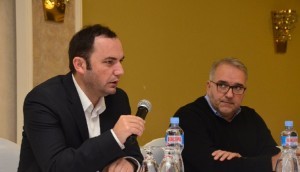The reports presented in media over the possible name to which Greece and Former Yugoslav Republic of Macedonia (FYROM) will agree on are “just speculation” and negotiations between the two countries are continuing, the Deputy Prime Minister of the FYROM, Bujar Osmani, told journalists in Athens on Tuesday.
Osmani is on an official visit to the Greek capital in a new impetus to resolve the decades-old name dispute that has soured relations between the two countries and blocked FYROM’s entry to NATO and the EU.
Asked to comment on media reports claiming that the name being discussed is the “Republic of New Macedonia“, he said:
“So far there is no agreement on some kind of solution. There are negotiations. We are waiting for the mediator [UN envoy Matthew] Nimitz to come later this month, hopefully with a proposal that we will consider and then take a position on that proposal. Whatever you hear in the news about different names and proposals are just speculation.”
Osmani said the next six months offer a “historic” opportunity to resolve the name dispute, which will allow his country to move towards NATO and EU integration.
“I believe that 2019 is a lost year due to several reasons, so 2018 is the golden year of opportunity for my country to make progress in terms of Euro-Atlantic integration. That’s why we are committed to finding a solution. I think there is a sincerity and commitment by the Greek side, we need to intensify the process in the coming days and weeks,” he said.
“We are aware that we in front of a historical year and especially historical six months in front of us where we need to reach some milestones that are in February in terms of the strategy of enlargement that will be released by the European Commission, the May summit of enlargement in Sofia, the June’s Council of European Union. These are very important milestones for us to reach and to make real progress,” he added.
Osmani said his government’s agenda of reforms “is very clear” and includes reforming “systemic weaknesses” within FYROM and solving long-standing political issues with the country’s neighbours. He said the government resolved its issues with Bulgaria and next is the name dispute with Greece.
“We are trying to create a positive atmosphere” he said, noting that confidence-building measures (CBMs) are a good framework to work on that context.
Asked if he expects a specific proposal from Nimitz when negotiators will meet for talks, he said he is hoping it will be but refused to comment on whether the word “Macedonia” will be part of the proposal, saying he cannot discuss details of the negotiations.
“I don’t think I’m helping the process if I’m discussing about the position of my country or Greece’s position. What is important is that we are committed to finding a solution, we are not trying to buy time, to delay, to procrastinate, but we are committed to finding a solution in these six months,” he said.
The minister admitted the public opinion in both countries “is not ready for the moment for a final solution”, which is why Greece and FYROM need to build trust and “eliminate the prejudices”.
“I always said that this problem is quite emotional. There are a lot of emotional layers above this problem that are added by politicians in their electoral agendas, and we need to peel off these layers and reach the national core of the problem and then find a solution. That’s the real goal of these CBMs,” he said.
“We are very sincere, we are very transparent, we are not hiding anything from our people but we need to find some common ground and then go public with the solution,” he added.
Source: thegreekobserver.com
Ask me anything
Explore related questions





